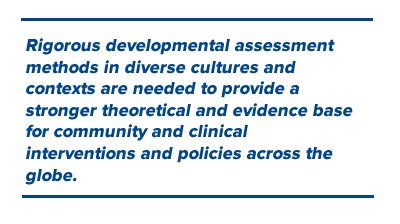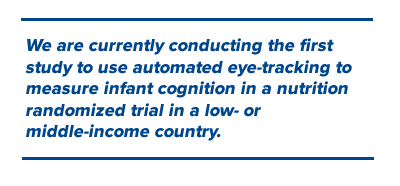 Rigorous developmental assessment methods in diverse cultures and contexts are needed to provide a stronger theoretical and evidence base for community and clinical interventions and policies across the globe. However, cognitive and developmental assessment is challenging in contexts where standardized assessments tools do not exist. Inherent bias can be introduced when transferring such assessments from one context to another. Accurate assessment requires both that the method is valid and that the method is implemented correctly. Implementation is challenging in large trials, in which thousands of children must be assessed in rural settings by data collectors who have no prior experience in developmental assessment. We have developed and published systems for test selection, adaptation, and evaluation to ensure the validity of assessment methods in different contexts, as well as systems for training, implementation, and quality control to administer cognitive and developmental assessments at high quality in large-scale trials. We have also developed several new versions of the Developmental Milestones Checklist, which is a tool designed for developmental assessment in low-resource contexts, and is currently being used to evaluate randomized trials in five countries. Most recently, we have demonstrated the validity of a translated Social Responsiveness Scale to measure autism symptomology among children in Vietnam.
Rigorous developmental assessment methods in diverse cultures and contexts are needed to provide a stronger theoretical and evidence base for community and clinical interventions and policies across the globe. However, cognitive and developmental assessment is challenging in contexts where standardized assessments tools do not exist. Inherent bias can be introduced when transferring such assessments from one context to another. Accurate assessment requires both that the method is valid and that the method is implemented correctly. Implementation is challenging in large trials, in which thousands of children must be assessed in rural settings by data collectors who have no prior experience in developmental assessment. We have developed and published systems for test selection, adaptation, and evaluation to ensure the validity of assessment methods in different contexts, as well as systems for training, implementation, and quality control to administer cognitive and developmental assessments at high quality in large-scale trials. We have also developed several new versions of the Developmental Milestones Checklist, which is a tool designed for developmental assessment in low-resource contexts, and is currently being used to evaluate randomized trials in five countries. Most recently, we have demonstrated the validity of a translated Social Responsiveness Scale to measure autism symptomology among children in Vietnam.
 Evaluating the efficacy of interventions targeting pregnancy and infancy requires objective and sensitive measures of infant cognition, during a period when infants have a limited behavioral repertoire. Measures of infant looking behavior may be more sensitive than global behavioral measures to factors that constrain early child development in low-resource contexts. Infants’ eye gazes provide meaningful information about their cognitive processing. For example, an infant’s novelty preference, demonstrated by looking longer at a new picture compared to a picture that he or she has seen before, shows that the infant remembers the previously seen picture. We are currently conducting the first study to use automated eye-tracking to measure infant cognition in a nutrition randomized trial in a low- or middle-income country. In the Mazira Project, we are measuring the effect of providing an egg per day for six months on the cognitive development of infants age 6-15 months in Malawi.
Evaluating the efficacy of interventions targeting pregnancy and infancy requires objective and sensitive measures of infant cognition, during a period when infants have a limited behavioral repertoire. Measures of infant looking behavior may be more sensitive than global behavioral measures to factors that constrain early child development in low-resource contexts. Infants’ eye gazes provide meaningful information about their cognitive processing. For example, an infant’s novelty preference, demonstrated by looking longer at a new picture compared to a picture that he or she has seen before, shows that the infant remembers the previously seen picture. We are currently conducting the first study to use automated eye-tracking to measure infant cognition in a nutrition randomized trial in a low- or middle-income country. In the Mazira Project, we are measuring the effect of providing an egg per day for six months on the cognitive development of infants age 6-15 months in Malawi.
Publications
Fernald, Lia C. H.; Prado, Elizabeth; Kariger, Patricia; Raikes, Abbie. 2017. A Toolkit for Measuring Early Childhood Development in Low and Middle-Income Countries. World Bank, Washington, DC. [PDF]
Nguyen, P., Ocansey, E. M., Miller, M., Le, D. T. K., Schmidt, R. J., Prado, E. L. (2019). The reliability and validity of the Social Responsiveness Scale to measure autism symptomology in Vietnamese children. Autism Research. Epub ahead of print. [Wiley Online Library]
Prado EL, Phuka J, Ocansey E, Maleta K, Ashorn P, Ashorn U, Adu-Afarwuah S, Oaks BM, Lartey A, Dewey KG. (2018). “A method to develop vocabulary checklists in new languages and their validity to assess early language development.” J Health Popul Nutr 37(1): 13.
Prado, E. L., Abubakar, A. A., Abbeddou, S., Jimenez, E. Y., Some, J. W., & Ouedraogo, J. B. (2014). Extending the Developmental Milestones Checklist for use in a different context in Sub-Saharan Africa. Acta paediatrica, 103(4), 447-454.
Semrud-Clikeman, M., Romero, R. A. A., Prado, E. L., Shapiro, E. G., Bangirana, P., & John, C. C. (2017). Selecting measures for the neurodevelopmental assessment of children in low- and middle-income countries. Child Neuropsychology, 23(7), 761-802.
Prado, E. L., Hartini, S., Rahmawati, A., Ismayani, E., Hidayati, A., Hikmah, N., et al. (2010). Test selection, adaptation, and evaluation: Three critical steps to assess nutritional influences on child development in developing countries. British Journal of Educational Psychology, 80, 31-53.
